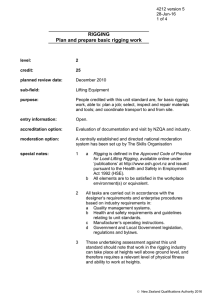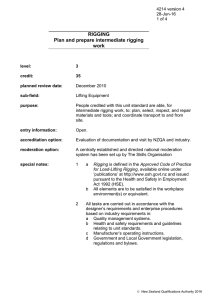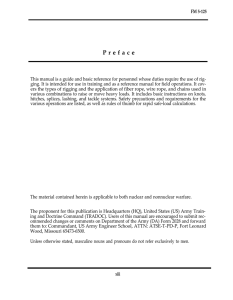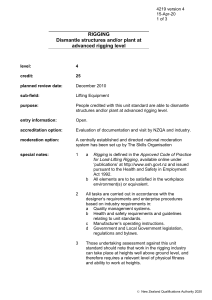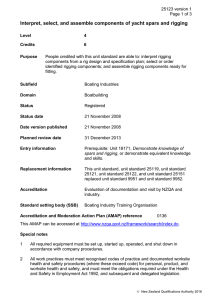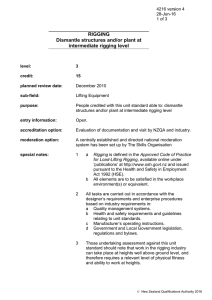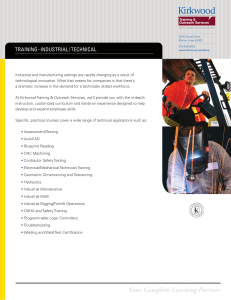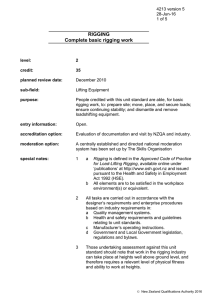RIGGING Plan and prepare advanced rigging work
advertisement
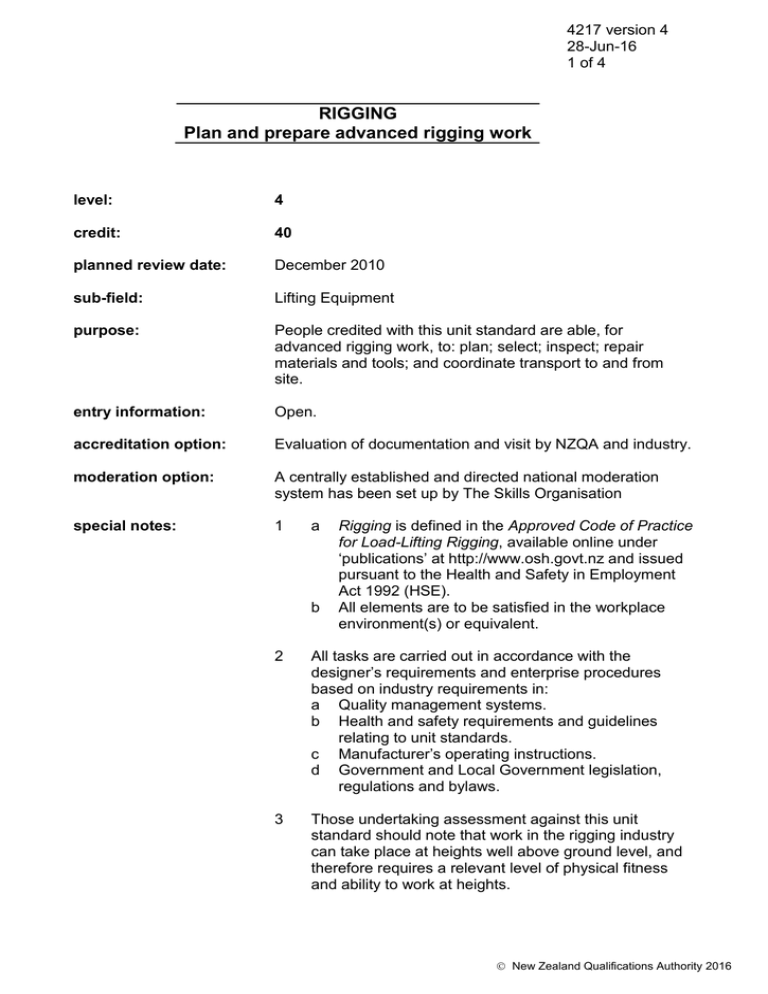
4217 version 4 28-Jun-16 1 of 4 RIGGING Plan and prepare advanced rigging work level: 4 credit: 40 planned review date: December 2010 sub-field: Lifting Equipment purpose: People credited with this unit standard are able, for advanced rigging work, to: plan; select; inspect; repair materials and tools; and coordinate transport to and from site. entry information: Open. accreditation option: Evaluation of documentation and visit by NZQA and industry. moderation option: A centrally established and directed national moderation system has been set up by The Skills Organisation special notes: 1 a b Rigging is defined in the Approved Code of Practice for Load-Lifting Rigging, available online under ‘publications’ at http://www.osh.govt.nz and issued pursuant to the Health and Safety in Employment Act 1992 (HSE). All elements are to be satisfied in the workplace environment(s) or equivalent. 2 All tasks are carried out in accordance with the designer’s requirements and enterprise procedures based on industry requirements in: a Quality management systems. b Health and safety requirements and guidelines relating to unit standards. c Manufacturer’s operating instructions. d Government and Local Government legislation, regulations and bylaws. 3 Those undertaking assessment against this unit standard should note that work in the rigging industry can take place at heights well above ground level, and therefore requires a relevant level of physical fitness and ability to work at heights. New Zealand Qualifications Authority 2016 4217 version 4 28-Jun-16 2 of 4 RIGGING Plan and prepare advanced rigging work 4 The range statement which applies to the whole unit standard and defines advanced is as follows: The equipment range is to include work associated with: movement of plant and equipment; steel erection; all hoists; placement of pre-cast concrete; static lines and fall arrest systems; mast climbers; perimeter safety screens and shutters; cantilevered crane loading platforms fixed to the building and/or structure; rigging of cranes; conveyors; dredges and draglines; tilt-slabs; dismantling; dual lifts; rigging of gin poles; shear legs; flying foxes and cableways; guyed derricks and structures; suspended scaffolds; and fabricated hung scaffolds. Elements and Performance Criteria element 1 Plan an advanced rigging job. performance criteria 1.1 Site plans and drawings are interpreted in accordance with industry practices. Range: 1.2 work specifications; hazards – overhead, on-ground, underground; load moving equipment. Line drawings and site sketches are prepared in accordance with enterprise procedures. Range: marking plans, material schedules, site access and egress, site dimensions. 1.3 Mass and dimensions of load are determined and confirmed in accordance with HSE code of practice and enterprise procedures. 1.4 Job feasibility and schedule are checked with enterprise nominated person in accordance with HSE code of practice and enterprise procedures. 1.5 Job is planned in accordance with HSE code of practice and equipment manufacturers’ specifications. New Zealand Qualifications Authority 2016 4217 version 4 28-Jun-16 3 of 4 RIGGING Plan and prepare advanced rigging work Range: 1.6 job method and sequence, hazard prevention and/or control measures, safety procedures, coordination with site personnel, materials, tools and equipment, approvals for work and persons. Existence of instructions from the load designer is checked, and designer is consulted for instructions for more complex load movement tasks where written instructions are not provided. element 2 Select, inspect, and repair materials and tools. performance criteria 2.1 Rigging equipment, materials, and tooling are inspected, and damaged or worn items are repaired or rejected in accordance with HSE code of practice and enterprise procedures. 2.2 Alteration of standard equipment, materials, and tooling is done or arranged for the job in accordance with HSE code of practice and enterprise procedures. 2.3 Special equipment for the job is manufactured in accordance with HSE code of practice and enterprise procedures. 2.4 Safe working loads and rigging gear are prepared in accordance with manufacturers’ specifications. element 3 Coordinate transport of equipment to and from site. performance criteria 3.1 Equipment and tooling is loaded on transport in the sequence required for erection or dismantling of job in accordance with enterprise procedures. 3.2 Load is prepared in a manner to prevent injury to personnel and damage to components in transit in accordance with enterprise procedures. New Zealand Qualifications Authority 2016 4217 version 4 28-Jun-16 4 of 4 RIGGING Plan and prepare advanced rigging work Comments on this unit standard Please contact The Skills Organisation reviewcomments@skills.org.nz if you wish to suggest changes to the content of this unit standard. Please Note Providers must be accredited by the Qualifications Authority or a delegated interinstitutional body before they can register credits from assessment against unit standards or deliver courses of study leading to that assessment. Industry Training Organisations must be accredited by the Qualifications Authority before they can register credits from assessment against unit standards. Accredited providers and Industry Training Organisations assessing against unit standards must engage with the moderation system that applies to those standards. Accreditation requirements and an outline of the moderation system that applies to this standard are outlined in the Accreditation and Moderation Action Plan (AMAP). The AMAP also includes useful information about special requirements for providers wishing to develop education and training programmes, such as minimum qualifications for tutors and assessors, and special resource requirements. This unit standard is covered by AMAP 0183 http://www.nzqa.govt.nz/site/framework/search.html. which can be accessed at New Zealand Qualifications Authority 2016
